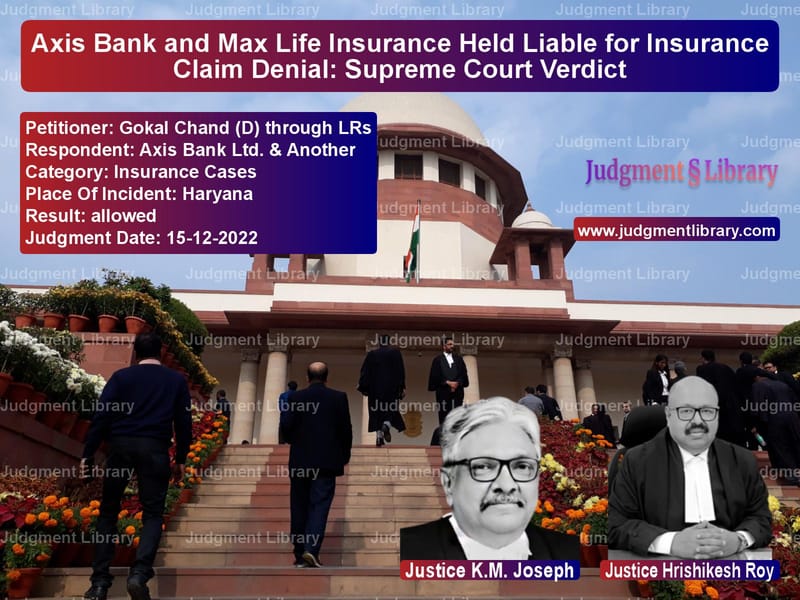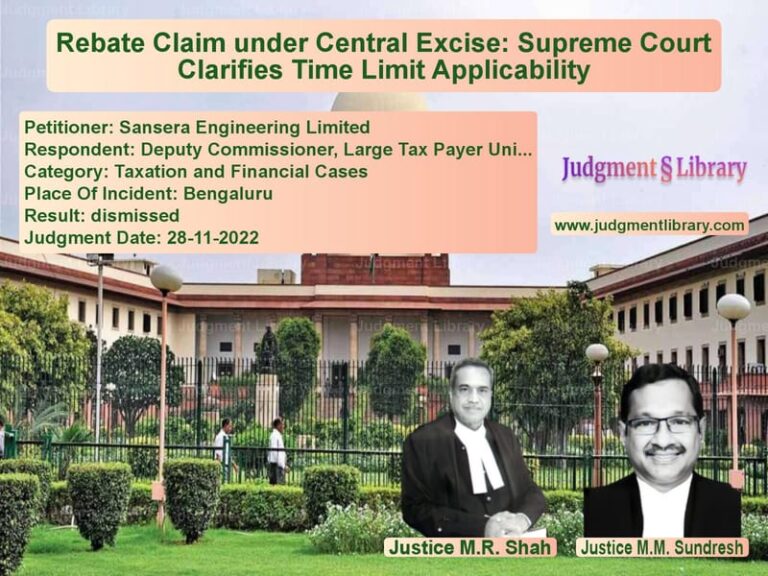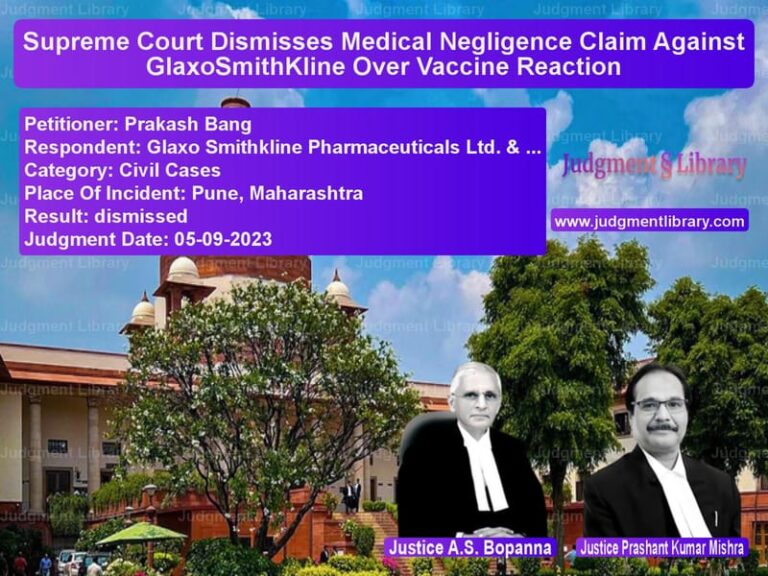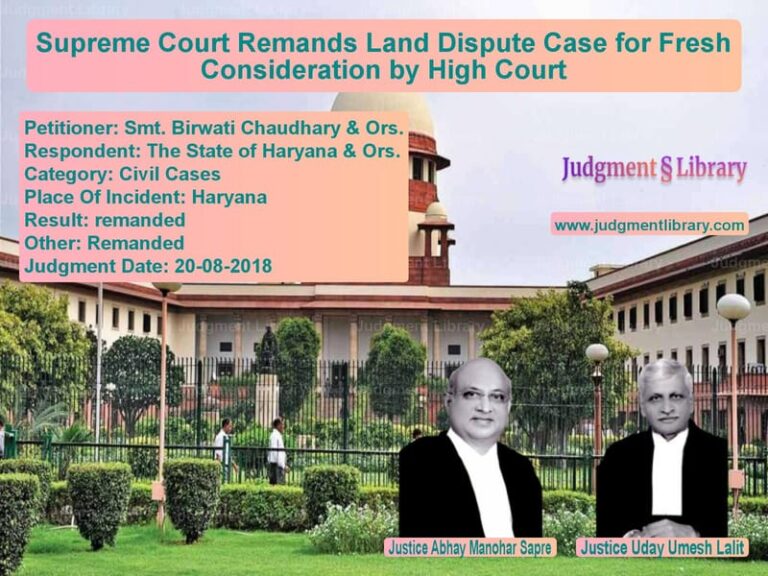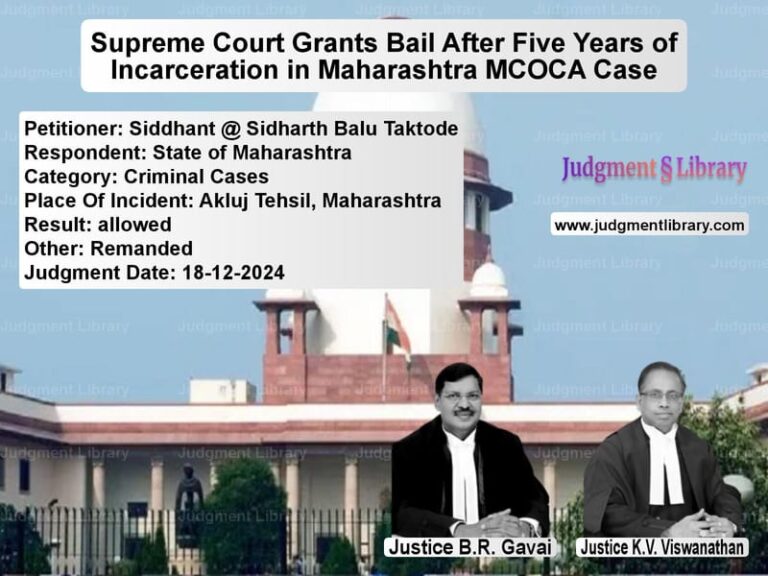Axis Bank and Max Life Insurance Held Liable for Insurance Claim Denial: Supreme Court Verdict
The Supreme Court of India recently delivered a landmark judgment in the case of Gokal Chand (D) through LRs vs. Axis Bank Ltd. & Another, addressing an insurance claim dispute linked to a home loan agreement. The case revolved around the denial of an insurance claim by Max Life Insurance after the death of the insured, Gokal Chand. The primary issue was whether the insurance company could refuse the claim on the grounds that the policy was not finalized, despite having received the premium amount and subjecting the insured to medical tests.
The Supreme Court ruled in favor of the appellant, highlighting a clear case of deficiency in service and bad faith on the part of the insurer. The judgment not only reinforces the rights of policyholders but also holds financial institutions accountable for their role in facilitating insurance agreements.
Background of the Case
The dispute originated when Axis Bank sanctioned a home loan of Rs. 70,99,172 to Gokal Chand on July 25, 2017. As a pre-condition, the bank mandated a life insurance policy with Max Life Insurance (Respondent No. 2). The insurance premium of Rs. 6,24,172 was deducted from the loan amount and paid to the insurer.
Read also: https://judgmentlibrary.com/supreme-court-rules-in-favor-of-policyholder-in-insurance-claim-dispute/
On July 30, 2017, Gokal Chand underwent a treadmill test as part of the insurance formalities. Tragically, he passed away from cardiac arrest on August 8, 2017. When his legal heirs filed a claim with Max Life Insurance, they were informed that the insurance proposal had been ‘postponed’ due to the treadmill test results. The insurer refused to honor the claim, citing that the policy was never finalized.
The appellants filed a complaint before the State Consumer Disputes Redressal Commission, which ruled in favor of the insurance company, stating that there was no concluded contract. The National Consumer Disputes Redressal Commission upheld this decision. Dissatisfied, the appellants approached the Supreme Court.
Arguments by the Appellant
The appellant’s counsel, Mr. Harshit Khanduja, presented the following key arguments:
- The death of the insured was communicated to the insurer on August 16, 2017, after which the insurance company suddenly claimed that the proposal had been postponed via an ante-dated letter dated August 3, 2017.
- The insurance company retained the premium amount even after the insured’s death and only refunded it after receiving the death intimation.
- The insured had undergone the mandatory treadmill test, which did not indicate any major health concerns, making the postponement of the policy suspicious and unjustified.
- The insurance company’s actions amounted to a fraudulent afterthought designed to evade liability.
Arguments by the Respondents
The respondents, represented by Ms. Suman Bagga for Max Life Insurance and Mr. Devendra Kumar Singh for Axis Bank, countered:
- The insurance policy was never finalized as the proposal had been postponed due to the treadmill test findings.
- There was no contractual obligation to honor the claim since the policy had not been formally accepted.
- Max Life Insurance refunded the premium amount to the bank, and thus, no concluded contract existed between the insured and the insurer.
- Axis Bank had merely facilitated the process and was not responsible for the insurance company’s decision.
Supreme Court’s Judgment
The Supreme Court strongly criticized the actions of the insurance company and the bank, concluding that their conduct amounted to a clear case of deficiency of service. Key findings from the judgment include:
- Axis Bank mandated life insurance as a pre-condition for the loan, making it an integral part of the agreement. Therefore, the insurance company had a duty to ensure timely processing.
- The treadmill test results did not justify postponement of the policy, and the insurer’s decision to issue an ante-dated letter after receiving the death intimation was a dishonest attempt to avoid liability.
- “The conduct of the respondent No. 2 cannot be countenanced against the good faith standards that an insurance contract warrants.”
- “The insurance company’s issuance of a back-dated letter to justify policy postponement is a clear indication of malafide intent.”
- The retention of the premium amount without immediate rejection of the policy was inconsistent with the insurer’s claim that no contract had been concluded.
- The insurance company only refunded the premium after learning of the insured’s death, further reinforcing suspicions of bad faith.
Precedents Cited
The Court relied on the ruling in D. Srinivas vs. SBI Life Insurance Co. (2018), where it was held that an insurance contract is concluded when the insurer accepts the premium, even if formal documentation is pending.
Additionally, the judgment referenced Life Insurance Corporation of India vs. Raja Vasireddy Komalavalli Kamba (1984), which held that mere retention of premium does not signify acceptance. However, the Court distinguished this case by noting that in the present matter, medical tests were completed and the premium was retained until after the death intimation.
Impact of the Judgment
This ruling serves as a crucial precedent in insurance disputes involving loan-linked policies. It reinforces the following principles:
- Insurers must act in good faith and cannot arbitrarily deny claims after receiving premiums.
- Banks mandating insurance policies must ensure transparency and fair dealing between borrowers and insurers.
- Post-facto rejections and suspicious postponements of policies will not be tolerated by the judiciary.
- Consumers have the right to fair treatment, and fraudulent practices in insurance transactions will be scrutinized.
Conclusion
The Supreme Court’s decision in Gokal Chand vs. Axis Bank & Max Life Insurance marks a significant victory for consumers. The judgment underscores that insurance companies cannot evade liability by manipulating documentation and issuing backdated letters. It further highlights the need for stronger consumer protection in financial transactions where banks and insurers act in tandem.
The ruling mandates Max Life Insurance to process the insurance claim and remit the payable amount to the legal heirs of the deceased. This case stands as a stark reminder to financial institutions and insurers that they must adhere to ethical business practices and maintain transparency in dealings with customers.
Petitioner Name: Gokal Chand (D) through LRs.Respondent Name: Axis Bank Ltd. & Another.Judgment By: Justice K.M. Joseph, Justice Hrishikesh Roy.Place Of Incident: Haryana.Judgment Date: 15-12-2022.
Don’t miss out on the full details! Download the complete judgment in PDF format below and gain valuable insights instantly!
Download Judgment: gokal-chand-(d)-thro-vs-axis-bank-ltd.-&-ano-supreme-court-of-india-judgment-dated-15-12-2022.pdf
Directly Download Judgment: Directly download this Judgment
See all petitions in Life Insurance Claims
See all petitions in Insurance Settlements
See all petitions in Judgment by K.M. Joseph
See all petitions in Judgment by Hrishikesh Roy
See all petitions in allowed
See all petitions in supreme court of India judgments December 2022
See all petitions in 2022 judgments
See all posts in Insurance Cases Category
See all allowed petitions in Insurance Cases Category
See all Dismissed petitions in Insurance Cases Category
See all partially allowed petitions in Insurance Cases Category

